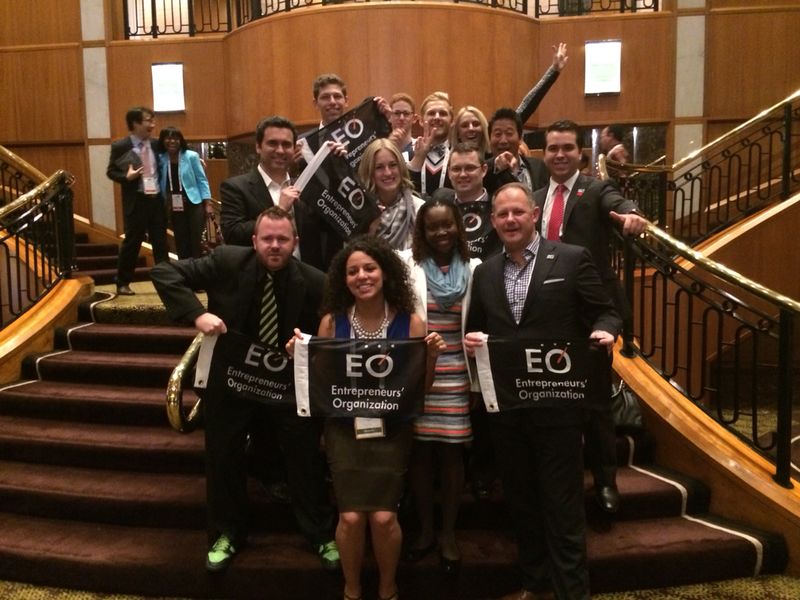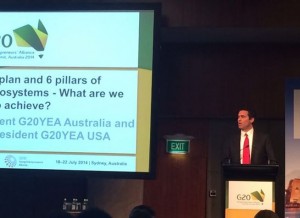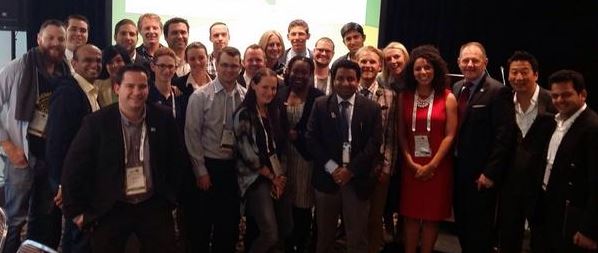
From 18-22 July, hundreds of young entrepreneurs from around the world united in Sydney, Australia, to participate in the G20 Young Entrepreneurs’ Alliance Summit, an annual event that promotes youth entrepreneurship as a powerful driver of economic renewal, job creation, innovation and social change. The official communiqué of the Summit is the voice of nearly two million business owners, all of whom are recommending youth entrepreneurship as a dominating force for strong, sustainable and balanced growth.
Recognizing young entrepreneurship as a driver of positive change, the Entrepreneurs’ Organization (EO) invited select EO members, Accelerators and winners of the Global Student Entrepreneur Awards (GSEA) to serve as U.S. delegates during the three-day Summit, with the support of EO Louisiana’s Kevin Langley, former EO Global Chairman and president of the U.S. delegation. While on site, EO’s delegates leveraged their experiences, best practices and strategic solutions to the benefit of other global entrepreneurs in attendance.

“It’s a big world, and it needs the help of the people in this room.”
–Kevin Langley
Members of the U.S. delegation included: Kevin Langley, Will Curran, Gene Lim, Jason S. Rechenberg, Miranda Barrett, Joshua Schoenbart, Solome Tibebu, Saudia Davis, Ryan Cross, Jorge Gamez, Harman Johar, BreAnna Fisher and Mohamed Ali. Follow their updates on our Twitter list: U.S. Delegation to #G20YEA.
Beyond the U.S. delegation, additional EO members stepped in to represent their countries at this preeminent event.

“Awesome to meet EOers from different parts of world at G20 #eonation makes even more sense to me @EntrepreneurOrg pic.twitter.com/alP7XlsQK0”
— Jayanthra Jayachandran (@jayanthra) 20 July, 2014
Shared insights and take-aways from other attendees include:
- David Hodge (EO Sydney member): “My biggest take-away? Innovation isn’t just about new technology. It can be just as effective to redeploy existing technology into sections previously not considered.”
- Will Curran (Accelerator participant and GSEA Global Finalist): “The networking is honestly the best thing. I’ve loved meeting all of the amazing people from across the world, especially the other members of EO!”
- Annush Ramasamy (EO Coimbatore member): “The G20 YEA is the best platform for young entrepreneurs to advocate policy toward entrepreneurship to their respective governments. This policy advocacy will enable the government.”
- Sarah Riegelhuth (EO Australia-Victoria member): “Personally, I would like to see an equal number of females as males participating in entrepreneurial ecosystems around the world. I believe that the Summit, and particularly Gen Y, are the agents of change to see this occur. This year, we have also been focusing on youth employment and the positive impact that having an understanding of entrepreneurship can have. I think we’d all like to see entrepreneurship included in the schooling system in some form.”
The Summit addressed key challenges facing young entrepreneurs, with “Pillar Sessions” focusing on actionable issues:
Government, Taxation and Regulation
In the government, taxation and regulation space, three overarching problems plague entrepreneurship across the board.
- Too Much Red Tape: Tax requirements and regulation systems are complicated and cumbersome.
- Tiering and Triggers: Tax systems do not include tiering based on the stage of a company’s life cycle. New ventures are taxed at the same rate as established companies, resulting in higher risk for entrepreneurs.
- Need for Education: There is a lack of understanding regarding taxation rules, worsened by a lack of entrepreneurial thinking when creating tax regulations. Education doesn’t need to be structured— peer-to-peer education and practical learning through mentorship helps people with the same problems share such knowledge
Education and Growth:
- Universities: The education system is too slow and does not prepare students for the real world.
- Skills Mismatch: Students are getting degrees with the assumption that this will lead to a job, but they’re being trained for jobs that don’t exist— they are over- and under-educated. There is a need to expose young people to entrepreneurship through practical experiences.
- Lack of an Entrepreneurship Learning Space: Entrepreneurship is being taught by people who do not have entrepreneurial experience. Culturally, there are no role models in the system to lead or mentor, and no entrepreneurship in mainstream education.
- Fear of Failure: There is a lack of tolerance toward the concept of “Flearn,” or “learning from failure.” There is a need to create an ecosystem that supports those who have failed.
To catch up on the continuing conversation around youth entrepreneurship, follow the hashtag #g20yea on Twitter.
Categories: EO News
